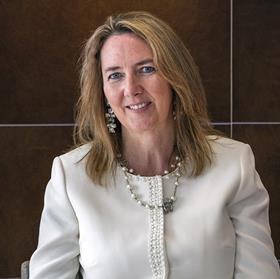At the beginning of a new year and decade, property’s leading lights reveal their hopes, expectations and resolutions for 2020 in the second of a two-part special.

Amanda Clack
Executive director and head of strategic advisory, CBRE
We need to take steps to invest in the public infrastructure projects that will enable the unilateral growth of our towns and cities to compete on the global stage, building our economy, creating jobs and enabling thriving communities that provide the connectivity necessary for the modern world.
Now much of the uncertainty of the second half of the last decade is lifting, we need to focus on providing investors with the opportunity to invest in the inherent value available in UK real estate.
We also need to take steps to reform and enhance construction. We need to be more efficient and effective at sustainably building the infrastructure, cities and homes for people to live, work and play in without compromising design, quality or cost, and that reflects the sustainable goals we need to be aspiring to.

James Gulliford
Joint head of UK investment, Savills
Despite the Conservative government receiving a mandate to deliver Brexit, uncertainty over the UK’s relationship with the EU will not immediately diminish, and property will continue to contend with a wide variety of old and new structural, economic and legislative changes throughout 2020 and beyond.
However, we do expect higher deal volumes, particularly in the office and logistics markets, as a number of non-domestic institutional investors that were deterred by Brexit uncertainty re-enter the market, and a rise in opportunistic investor activity in the retail sector, as some buyers now see some assets as competitively priced.

John Webber
Head of business rates, Colliers International
I hope every new MP’s Christmas stocking had an extra present – a copy of the HM Treasury Select Committee (TSC) Report on Business Rates from Santa Mel Stride.
This report should be a clear roadmap for reform. A parliamentary majority of 80 should mean clarity on the 2021 Rating Revaluation and allow government to ‘walk the walk’.
Announcements that downward transition is scrapped from 2021 onwards and the multiplier will be reduced will give a major boost not only to occupiers but also landlords, and breathe life into our beleaguered town centres.
I also hope the Valuation Office Agency is given more manpower so that it can properly resource the appeals process and that it loses the ATM case in the Supreme Court. If it wins, we need legislation to prevent the sites of 430,000 vending machines being assessed.
My worst fear is that government will just tinker with reform and business rates will be kicked into the long grass as another lengthy review is commissioned. We don’t need one. We need action.
Resolutions: To go to client meetings setting out real progress on checks and challenges on the 2017 rating list and to continue prior discussion on several sectors for the draft 2021 rating list, giving clients clarity on their budgets post 2020.
I’d like to appear at Wembley with the fifth-most-decorated team in English football – Aston Villa – and to improve my golf, so my wife doesn’t continue to close the gap in our handicaps. The odd winner at Cheltenham would also be great!

Mark Caskey
EMEA chief executive of corporate solutions, JLL
I’d like to see corporate real estate leaders increasing their focus on the quality of their workspaces.
This relates to everything from health and wellbeing to people’s performance. While we will always need to focus on efficiency, I hope there will be greater recognition of the principles around inspirational and sustainable workplaces that can boost the way businesses operate and innovate, as well as embody a company’s values.
With economies across Europe remaining strong, we can expect companies to feel empowered to invest in workplaces and continue the digital transformation that will help them achieve their wider business goals. Ultimately, recognising the importance of the role of the workplace will add significant value to shareholders and employees alike.
Sustainability will play a much greater role in corporate thinking and supply chains. Given the link between the real estate industry and carbon emissions, companies have a hugely important role to play as part of the broader climate agenda.
I also see wellbeing, diversity and inclusion becoming a more material part of the corporate agenda, which will in turn have an impact on the way we think about our business models and support our clients.
Resolutions: To bring more purpose into the values and meaning of what we do as a property consultancy – not only for clients, but importantly, for our people, too.
What we stand for goes beyond providing services: it is about the impact we can have on the people who work in our buildings. To make this impact as positive as possible, we have to become more of a values-based organisation.
On a more personal note, I want to continue to strike a good balance between work life and my personal time.

Scott Tyler
Senior partner, Allsop
I hope we can now stop talking about Brexit and our clients, whether investors, developers or occupiers, can move forward with transactions and decisions that had been on hold. My expectation is that greater political clarity will lead to more business opportunities and I expect investment and leasing volumes to increase markedly. I expect many overseas investors to be significantly more active, acquiring both UK commercial and residential property.
It’s likely that we will see an increase in demand in commercial property from investors in the Far East, the Middle East, Germany and the US. During the next year, I also believe there will be more focus on sustainability and the operational efficiencies of the buildings we are transacting.
I think many will wake up and realise that the sector will need to adapt if we are to meet UK net-zero-emissions targets by 2050. There are huge environmental implications to investor and occupier portfolios that will need to be considered, including how real estate is valued.
Resolutions: To finally stop talking about Brexit and elections! And to turn those negative vibes into positive actions and energy to ultimately grow the Allsop business, as well as spending more quality, fun time with those who are close and dear to me.

Jo Cowen
Chief executive, Jo Cowen Architects
2019 was without question one of the most difficult political and economic years in the last decade, but 2020 looks brighter with the additional stability enabled by the election.
Investment in property has been restrained, Investment Committee unpredictable and developments halted.
As architects, this has severely affected our ability to take development forward. The planning process has become even lengthier and less viable due to continued pressure on the private sector to provide public services and affordable homes.
The UK has been torn between the extreme left and right with uncertainty about the UK’s economy felt throughout real estate. With clarity in terms of a majority government, and at least some certainty on Brexit, 2020 is set to be a year of cautious optimism, but definitely optimism.
Resolutions: Our focus remains on thoughtful design that is viable and deliverable. We are working harder than ever to react to commercial constraints, ensuring our BTR schemes are at the forefront of thinking in this constantly evolving sector. As a business, it’s about working with the most progressive developers, who are increasingly vertically integrated and invested in placemaking and people.
Continue to part 14 here
2020 vision: predictions for the year ahead
- 1
- 2
- 3
- 4
- 5
- 6
- 7
- 8
- 9
- 10
- 11
- 12
- 13
 Currently reading
Currently reading2020 vision: predictions for the year ahead (part 13)
- 14
- 15
- 16
- 17













































No comments yet